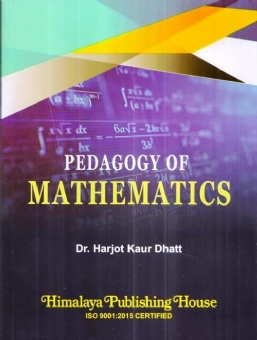Pedagogy of Mathematics
no information available
Mathematics, out of all sciences, excites the most apprehension among its learners. In our school experiences, we can easy identify the learners with 'mathematics phobia'. Most of such learners believe that they don't possess mind with mathematical bent. But this not true, as mathematics is a way of thinking that all human beings possess. The actual reason behind this widespread discomfort about mathematics is the fact that mathematics has its own language of notations and symbols. Meaning of a symbol changes with context for example '.', it means decimal in arithmetic class, but in geometry class, it is dot/point. As Mathematics is a compulsory subject upto secondary stage, therefore there is insistent need of good textbook on 'Pedagogy of Mathematics' which can prepare aspiring teachers to build their own confidence as well as confidence in their students. The presnet book is written to meet the felt need of student-teacher studying in various colleges of education whether in regular mode or distant mode. The special features of the present book are: . This book attempts to satisfy all the needs of mathematics teachers and student-teachers. . This book covers the revised B.Ed. syllabus of most universities. . Also includes, Nai Talim/Experiential Lesson Planning as suggested to be practiced by MHRD. . Language of the content is kept easy and understandable. . This book is comprehensive in terms of content; therefore it will satisfy needs of distant education students too. Contents - 1. Academic Discipline and its Classification 2. Mathematics in Relation to Other Academic Discipline 3. Place of Mathematics in the Present School Curriculum 4. Meaning, Nature and Scope of Mathematics 5. Aims and Objectives of Teaching Mathematics 6. NCF 2005: Objectives of Teaching Mathematics at Secondary and Higher Secondary Levels 7. Values of Teaching Mathematics 8. Maxims of Mathematics Teaching 9. Approaches of Curriculum Construction 10. Pedagogical Analysis and Unit Planning 11. Lesson Planning 12. Methods and Teachniques of Mathematics Teaching 13. Learner-centered Methods 14. Activity-centered Methods 15. Techniques of Mathematics Teaching 16. Learning Resources: Mathematics Laboratory and Mathematics Club 17. Learning Resources: Textbook 18. Digital Resources for Teaching Mathematics 19. Competencies of Mathematics Teacher 20. Need and Avenues of Continous Professional Development 21. Contribution of Mathematicians ... Read more Read less











